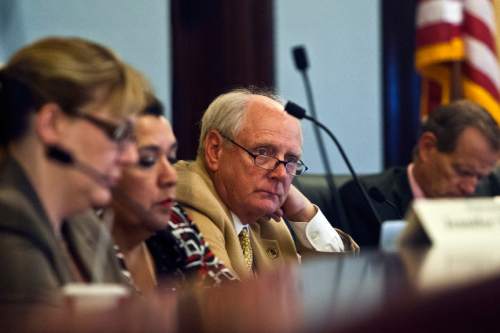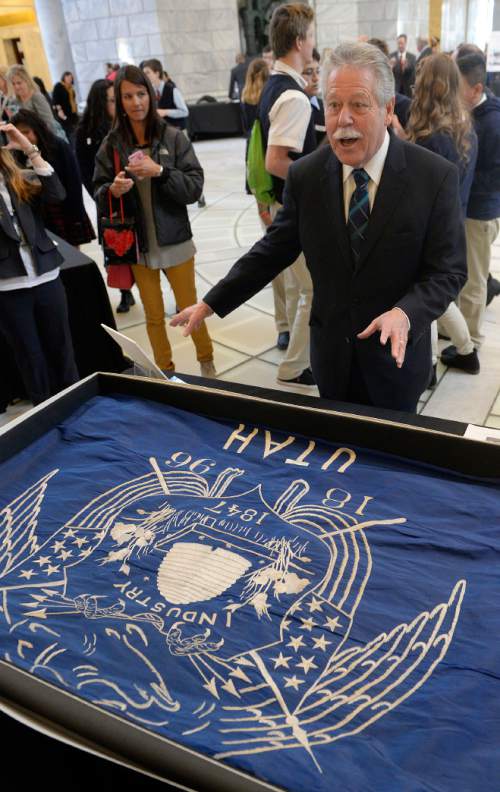This is an archived article that was published on sltrib.com in 2016, and information in the article may be outdated. It is provided only for personal research purposes and may not be reprinted.
Two Utah state lawmakers who took a paid trip to Azerbaijan recently praised the former Soviet republic's commitment to religious freedom, echoing sentiments frequently heard in U.S. state legislatures and disputed by a half-dozen prominent watchdog organizations.
Last week, Sen. Gene Davis, D-Salt Lake City, and Rep. Lynn Hemingway, D-Millcreek, read the citation in the Senate and House, respectively, before introducing Azerbaijan Consul General Nasimi Aghayev.
Azerbaijan's government, Davis told senators, "sees diversity as one of the country's great strengths."
Aghayev followed by saying it was appropriate that the citation was read in Utah, "one of the most tolerant and harmonious states."
His remarks met with applause.
But Human Rights Watch, Amnesty International, International Christian Concern, the Committee to Protect Journalists, the Pew Research Center and the U.S. State Department have all called into question the policies of Azerbaijan's government, including those related to religion.
Critics say the resource-rich nation, sandwiched between Russia and Iran and bordered on the west by longtime adversary Armenia, is more dictatorship than democracy, known for jailing activists and journalists and restricting activities of religious minorities.
Davis said he couldn't pronounce Azerbaijan before his May 2013 visit to Baku, the nation's capital, where he joined dozens of U.S. lawmakers at a celebration of Azerbaijan's independence. The Washington Post later reported that trips for members of Congress and their staffs were funded with money funneled to U.S.-based nonprofits by the nation's state oil company.
Davis was invited by the nonprofit Pacifica Institute, he said, and he in turn invited Hemingway, a retired executive in the oil and gas industry.
The Pacifica Institute told The Tribune the trip was organized by the Turquoise Council, one of the Houston-based nonprofits tied to the state oil company in The Post's report.
Davis and Hemingway said they came away impressed with apparent progress in a region where progress is in short supply.
When Ilham Aliyev won re-election as president later in 2013, Davis sent Aliyev a note that was published on Aliyev's website.
"Citizens of your country, realizing their right to vote, demonstrated long-term commitment to democracy and expressed trust in your leadership again," he wrote.
Critics liken Aliyev, who succeeded his father, Heydar, in 2003, to an organized crime boss. The Post reported that a day before voting started in the 2013 election, a mobile app inadvertently sent out election "results."
Davis said he didn't follow the election; "all I did was congratulate a winner." In February 2014, he authored a citation honoring Aliyev — whom he says he has never met, but heard speak at the previous year's junket — that was read in the Utah House and Senate and presented to Azerbaijan's U.S. ambassador, Elin Suleymanov.
That March, an email was sent by the Armenian National Committee of America (ANCA) urging Utah's legislators "not to associate the good name and reputation of your state with a corrupt dictatorship like Azerbaijan."
Davis said his intent last week was to encourage Azerbaijan's progress in the specific realm of religious freedom. United Nations' Alliance of Civilizations will host its annual global forum in Baku this April, and last May, Azerbaijan's Los Angeles consulate says it held an event at an area LDS stake center that drew more than 800 people.
"All I have done is encourage religious freedom in that country," Davis said. "Have I taken a stand on their past history? No."
Nonetheless, a pair of Utah residents with Armenian heritage expressed strong opposition to his citation.
Former state Sen. Bill Barton, whose mother's family is Armenian, said he thinks Hemingway and Davis, whom he considers a longtime friend, were "wined and dined" into support. Barton said he wrote in an email to several senators that "you didn't know what was behind this, or you would not have done it."
Salt Lake City resident Miriam McFadden, who exchanged emails with Davis about her concerns, told The Tribune she was "mortified."
Even if its scope was narrowed to religious freedoms, she said, Azerbaijan is suspected to have razed thousands of medieval Armenian Christian headstones at a cemetery in Julfa in 2005, later found through satellite imagery to no longer exist after the nation's government had blocked inspection of the site.
"For us in Utah, where we claim that individual rights are so important ... to endorse a country so suppressive and corrupt, it just appalled me," McFadden said.
Davis said he has not heard of the Julfa incident.
The ANCA formally rebuked the citation. The letter's author, Western Region executive director Elen Asatryan, said by phone this week that such legislation has become common even though "all it takes is really to just Google 'Azerbaijan' " to see that the lawmakers have been duped.
Asatryan said citations like Utah's are propaganda fodder for Azerbaijan's highly controlled media — the Committee to Protect Journalists most recently ranked Azerbaijan as the world's fifth-most-censored press — to burnish Aliyev's image.
Since the start of February, the L.A. consulate has reported that governors in Montana, Hawaii and Nebraska have condemned the 1992 Khojaly Massacre, in which Armenian troops killed a disputed number of Azerbaijani citizens that the nation pegs at 613.
Lt. Gov. Spencer Cox, who was introduced to Aghayev by Davis and Hemingway last week, said Aghayev didn't mention Khojaly.
A 2015 report from the Arizona Capital Times found that 20 trips for Arizona lawmakers were paid for by the Azerbaijani government, though Davis said he's not aware of any Utah lawmakers who've visited besides himself and Hemingway. The Capital Times found that lawmakers had passed "often identical" resolutions in support of Azerbaijan in 33 states.
Journalists at The Capital Times and Honolulu Civil Beat learned of trips through legislator disclosures, but Davis and Hemingway said they did not report their trip because they don't believe it qualifies as a contribution or a conflict of interest.
"There's no way I'm getting remunerated in any way by Azerbaijan," said Davis.
Days before Davis and Hemingway read their citation in Utah, ANCA said Idaho Rep. Thomas Dayley withdrew a similarly worded resolution because it mobilized 90 local activists to share concerns.
While it may be that Azerbaijan is making a concerted effort to gain validation, Davis said, the ANCA is trying to shape the story, too. When the Senate last year commemorated the centennial of the Armenian Genocide, he said, "You don't think that was sent back to Armenia for them to brag about?"
In an email to The Tribune, Aghayev shared a 2010 Post editorial calling ANCA "a particularly noxious lobby" that undermines the interests of Armenia.
Davis said he isn't taking sides. "If we never forgive the past, then we continue to create disharmony throughout the world," he said.
The Pew Research Center reported last year that as of 2013, Azerbaijan was one of 18 countries with "very high" government restrictions on religion."
The State Department's 2014 report on religious freedoms in Azerbaijan says several of its laws limit the free exercise of religion and that it has detained religious activists and raided minority religious groups. Muslim and Christian groups complained that the process to import religious literature is onerous. State police were criticized for not intervening when individuals forcibly shaved off the beards of Salafi Muslims.
The State Department's report did allow that "[t]he government took some steps to improve religious tolerance, including providing support for activities by the Jewish community."
Aghayev wrote that "only religious sects, which advocate for hatred and violence against others and preach radicalism and extremism, are prohibited by relevant laws."
Hemingway admitted that it's "hard to tell" from a short trip, but that he believes the nation is "on the right track."
Said Hemingway: "I understand what's going on in the Middle East, and it's scary as all get-out, and I don't know that you'll find a true democracy there. I think it's very difficult to do that. But they come as close as I think you're going to find in that area."
Davis said Aghayev also met with representatives of The Church of Jesus Christ of Latter-day Saints and Rabbi Benny Zippel.
Twitter: @matthew_piper





